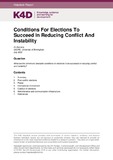| dc.contributor.author | Idris, Iffat | |
| dc.coverage.spatial | Various countries | en |
| dc.date.accessioned | 2022-10-07T11:19:13Z | |
| dc.date.available | 2022-10-07T11:19:13Z | |
| dc.date.issued | 2022-07 | |
| dc.identifier.citation | Idris, I. (2022). Conditions for elections to succeed in reducing conflict and instability. K4D Helpdesk Report 1187. Brighton, UK: Institute of Development Studies. DOI:10.19088/K4D.2022.124 | en |
| dc.identifier.uri | https://opendocs.ids.ac.uk/opendocs/handle/20.500.12413/17693 | |
| dc.description.abstract | Post-conflict elections can pave the way for democratisation and peacebuilding, but can also lead to renewed conflict. Minimum conditions for ensuring that elections promote the former and reduce conflict and instability include: peace and demilitarisation; international involvement; not holding post-conflict elections too early; holding national and local elections separately – ideally, local before national; election systems (notably proportional representation) that distribute rather than concentrate power; independent, permanent and well-resourced election management bodies; and media that promote voter education, messaging by parties and candidates, and election transparency. However, it is important to stress that specific criteria needed for successful post-conflict elections will be context-dependent.Post-conflict elections have the potential to establish legitimate government and can pave the way for democratisation and sustained peace. However, because they determine the distribution of power, they can also trigger renewed conflict. The risk of this is exacerbated by the difficult circumstances in which post-conflict elections are typically held (e.g. damaged infrastructure, weak institutions). The challenge is how to achieve the potential benefits while avoiding the risks. What are the conditions or criteria needed to ensure that post-conflict elections do not lead to conflict and instability?This review looks at the conditions needed to ensure that post-conflict election reduce conflict and instability. It draws on a mixture of academic and grey literature. While there was substantial literature on the various criteria, notably international involvement and election administration, it was largely gender-blind, as well as disability-blind. | en |
| dc.description.sponsorship | Foreign, Commonwealth and Development Office (FCDO) | en |
| dc.language.iso | en | en |
| dc.publisher | Institute of Development Studies | en |
| dc.relation.ispartofseries | K4D Helpdesk;1187 | |
| dc.rights.uri | https://www.nationalarchives.gov.uk/doc/open-government-licence/version/3/ | en |
| dc.subject | Politics and Power | en |
| dc.subject | Security and Conflict | en |
| dc.title | Conditions for Elections to Succeed in Reducing Conflict and Instability | en |
| dc.type | Helpdesk | en |
| dc.rights.holder | © Crown copyright 2022 | en |
| dc.identifier.doi | 10.19088/K4D.2022.124 | |
| dcterms.dateAccepted | 2022-07 | |
| rioxxterms.funder | Default funder | en |
| rioxxterms.identifier.project | K4D | en |
| rioxxterms.version | VoR | en |
| rioxxterms.versionofrecord | 10.19088/K4D.2022.124 | en |
| rioxxterms.funder.project | 0986883a-6d0f-4bb8-9c46-5e0682934d65 | en |

